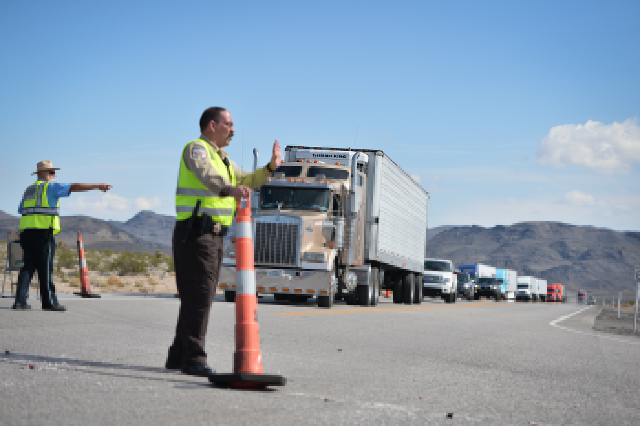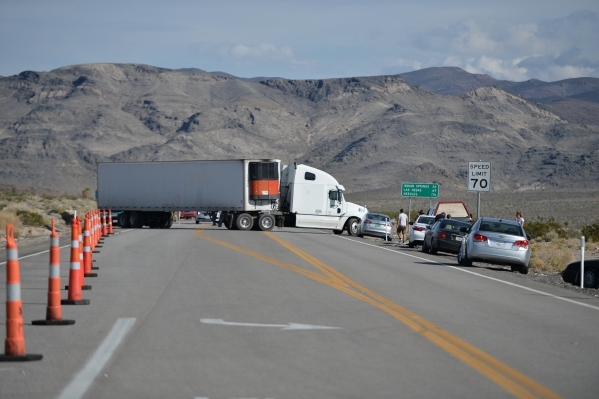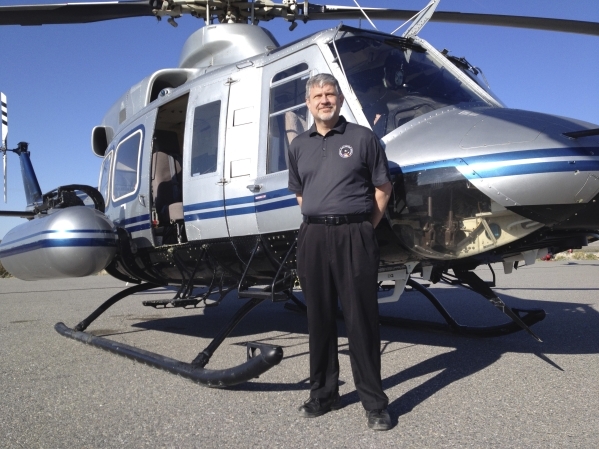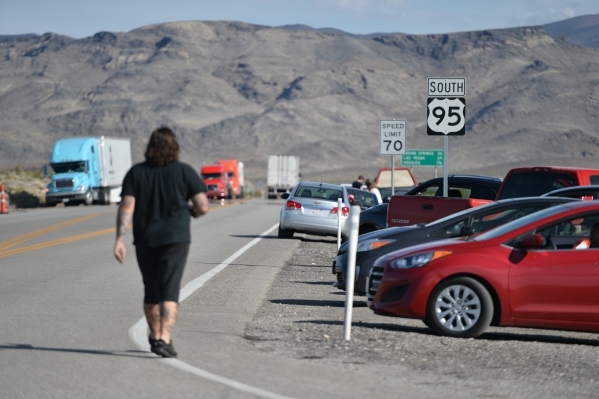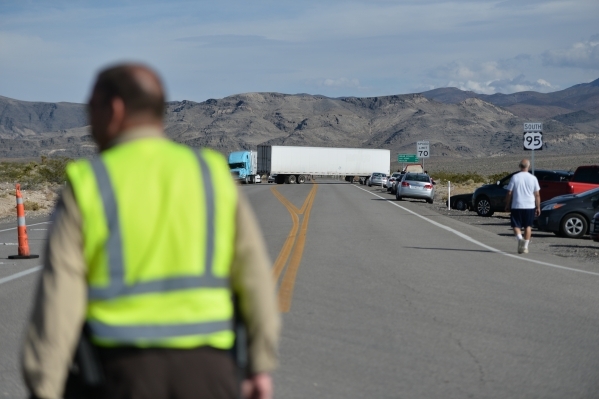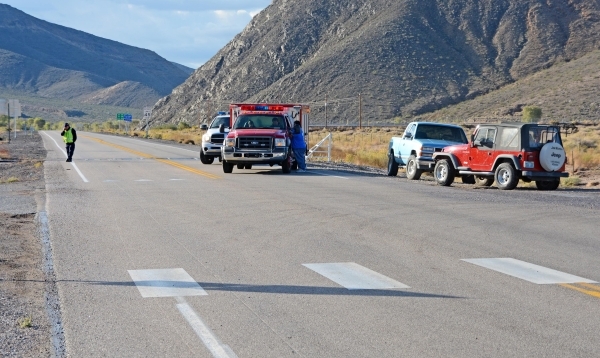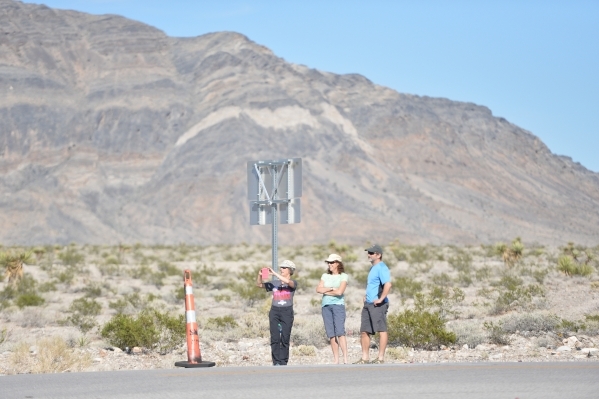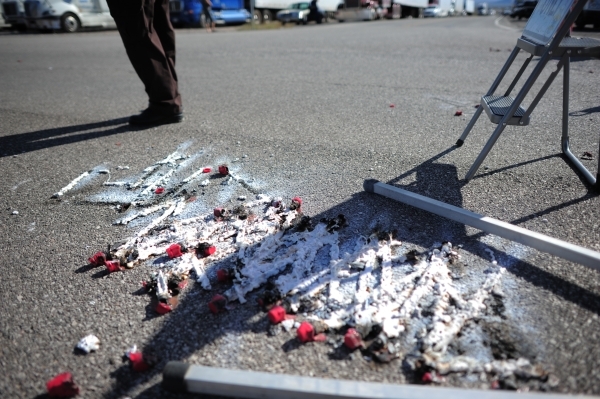Fire that shut down US 95 called hot, powerful
Whatever caught fire Sunday in the state-owned radioactive waste dump at the US Ecology site near Beatty packed a powerful punch, Nevada's chief fire marshal said Tuesday.
"We don't know exactly what caught fire. We're not exactly sure what was burning in that pit," Fire Marshal Chief Peter Mulvihill said in a conference call with reporters.
He said in the early stages of the fire "there was some energetic burning" that blew a hole in the cover soil that caps trench No. 14, where low-level radioactive materials were buried in unlined, clay terrain in the 1970s.
Mulvihill added that investigators who were converging to begin their probe at the site Tuesday, about 10 miles south of Beatty and about 108 miles northwest of Las Vegas, don't know yet if an explosion occurred before the fire was reported to the Nevada Department of Public Safety and Emergency Management about 2:30 p.m. Sunday.
"There was something that definitely burned very hot," he said.
The state's public safety team decided to allow the fire to burn itself out instead of trying to douse it because they didn't want put water on any material that might be reactive to water else they could potentially exacerbate the problem.
"That was a prudent and reasonable approach for local officials to take," Mulvihill said, adding that the fire was no longer visible in the early morning hours Monday.
The fire prompted authorities to shut down a 140-mile stretch of U.S. Highway 95 for nearly 24 hours. It happened as Nye County's first responders were grappling with flash flooding from heavy rains Sunday.
The state's probe will consider if the fire was related to the wet weather, and if disposal records kept by the state in Carson City and at the site list any materials that could have reacted with water to cause the fire.
Dump history
For 30 years — from 1962 through 1992 — the dump operated by US Ecology and its predecessor, Nuclear Engineering Co., on state land leased to the companies was one of a few graveyards in the United States for disposing low-level nuclear waste.
Items buried at the 40-acre site include contaminated laboratory gear, medical isotopes and nuclear reactor crud but not highly radioactive used-nuclear-fuel assemblies, the type of high-level waste the government has planned to entomb in Yucca Mountain, 100 miles northwest of Las Vegas.
The Beatty site was licensed by the Nuclear Regulatory Commission until 1997 when authority was transferred to Nevada after the low-level radioactive waste portion of the site was closed. US Ecology continues to operate a 40-acre landfill for hazardous waste including chemical waste on land the company leases from the state.
Caleb Cage, chief of Nevada's emergency management division, said preliminary results of aerial surveys and ground samples that were collected during the response to the fire by Department of Energy aircraft and four Nevada National Guard soldiers who walked within 6 feet of the burn center turned up negative for radioactivity.
He said there are no cost estimates yet for the multi-agency response that involved a twin-engine fixed-wing aircraft and a helicopter equipped with radiation-detection sensors. Both aircraft are part of the Department of Energy's remote sensing laboratory at Nellis Air Force Base.
Jon Bakkendahl, of the state's Radiation Control Program, said preliminary results from the aerial survey gives the state's public safety team confidence that there is nothing in the fire's plume that was radioactive based on negative results for gamma rays "that can travel a long way."
Mulvihill said any heavier radioactive beta or alpha particles would be expected to show up closer to the surface of the burn hole in soil samples but none, so far, have been detected.
Asked if an independent investigation should be conducted to validate the integrity of the probe given that the state is conducting an investigation of an incident that happened on its own land, Department of Public Safety Director James Wright said the state has the expertise and "at this point we feel we have to get the initial findings."
"We will determine those findings and determine the appropriate course of action. If something has to be fixed, we will fix it," Wright said.
Contact Keith Rogers at krogers@reviewjournal.com or 702-383-0308. Find him on Twitter: @KeithRogers2



